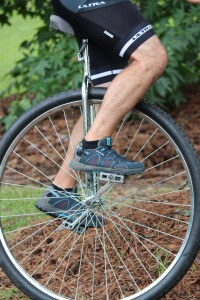Mastering the Art of Falling
Last night I rode my “commuter unicycle” around the neighborhood on an 8 mile workout. As an added benefit, I accumulated dozens of baffled expressions and spontaneous smiles from motorists and passers by – witnesses to something unexpected. I’ll admit that I enjoy that part. Maybe it’s a touch of showmanship. But I’d like to think it’s mostly a desire to deliver a sense of wonder, even if they’re only wondering, why the heck would someone do that?
touch of showmanship. But I’d like to think it’s mostly a desire to deliver a sense of wonder, even if they’re only wondering, why the heck would someone do that?
Atop the silent cycle, my mind is engaged in a state of constant balancing – not only of the mechanics of the ride, but also of the simultaneous orchestration of both relaxation and alertness. One must always be ready for a surprise adjustment, or even a fall, and yet completely at ease in the moment. There’s a meditative relaxation, like many challenging physical activities. You can only get there by learning that falling isn’t all that bad.
You’ve learned this, as well. You have mastered the “Art of Falling,” although it has been awhile. For an estimate of when, subtract 1 from your current age, and you’ll arrive at the years passed since you were immersed in the study of walking … and falling.
How do we fail without breaking? Our bodies, sure. But, more importantly, our spirits. You probably don’t remember, so it may be helpful to find a one year old who is currently in the process. They, and you, are able to fall with a sense of grace. Even amusement. No damage done to the ego. Just learning – a tad more information and experience and information to apply enthusiastically to “next time.”
When did we lose that? And how do we get it back? I am speaking of the ability to learn without self judgement and to fail without a blow to self-esteem. The consequences of making mistakes, if you could accurately access without judgement, are not all that bad. In fact, if we could find ourselves amused by our own “temporary incompetence,” we’d all get to mastery a whole lot faster.
Leave a Comment
You must be logged in to post a comment.
[…] P.S. Love this recent blog by Dan called, The Art of Falling. […]